
Augustine of Hippo, also known as Saint Augustine, was a theologian and philosopher of Berber origin and the bishop of Hippo Regius in Numidia, Roman North Africa. His writings influenced the development of Western philosophy and Western Christianity, and he is viewed as one of the most important Church Fathers of the Latin Church in the Patristic Period. His many important works include The City of God, On Christian Doctrine, and Confessions.
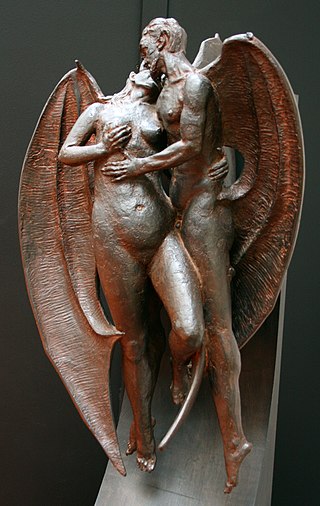
A devil is the personification of evil as it is conceived in various cultures and religious traditions. It is seen as the objectification of a hostile and destructive force. Jeffrey Burton Russell states that the different conceptions of the devil can be summed up as 1) a principle of evil independent from God, 2) an aspect of God, 3) a created being turning evil, and 4) a symbol of human evil.

The Gospel of Mark is the second of the four canonical gospels and one of the three synoptic Gospels. It tells of the ministry of Jesus from his baptism by John the Baptist to his death, the burial of his body, and the discovery of his empty tomb. It portrays Jesus as a teacher, an exorcist, a healer, and a miracle worker, though it does not mention a miraculous birth or divine pre-existence. He refers to himself as the Son of Man. He is called the Son of God but keeps his messianic nature secret; even his disciples fail to understand him. All this is in keeping with the Christian interpretation of prophecy, which is believed to foretell the fate of the messiah as suffering servant.

The Gospel of Matthew is the first book of the New Testament of the Bible and one of the three synoptic Gospels. It tells how Israel's Messiah, Jesus, comes to his people but is rejected by them and how, after his resurrection, he sends the disciples to the gentiles instead. Matthew wishes to emphasize that the Jewish tradition should not be lost in a church that was increasingly becoming gentile. The gospel reflects the struggles and conflicts between the evangelist's community and the other Jews, particularly with its sharp criticism of the scribes and Pharisees with the position that through their rejection of Christ, the Kingdom of God has been taken away from them and given instead to the church.
The Old Testament (OT) is the first division of the Christian biblical canon, which is based primarily upon the 24 books of the Hebrew Bible, or Tanakh, a collection of ancient religious Hebrew and occasionally Aramaic writings by the Israelites. The second division of Christian Bibles is the New Testament, written in Koine Greek.

Yahweh was an ancient Levantine deity, and national god of the Israelite kingdoms of Israel and Judah. Though no consensus exists regarding the deity's origins, scholars generally contend that Yahweh emerged as a "divine warrior" associated first with Seir, Edom, Paran and Teman, and later with Canaan. The origins of his worship reach at least to the early Iron Age, and likely to the Late Bronze Age, if not somewhat earlier.
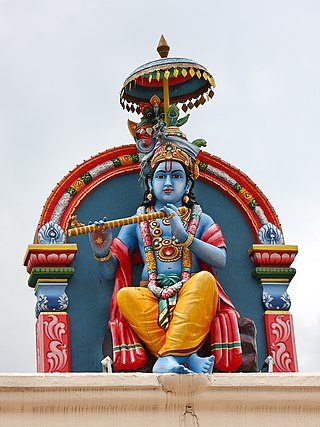
Krishna is a major deity in Hinduism. He is worshipped as the eighth avatar of Vishnu and also as the Supreme God in his own right. He is the god of protection, compassion, tenderness, and love; and is one of the most popular and widely revered among Hindu divinities. Krishna's birthday is celebrated every year by Hindus on Krishna Janmashtami according to the lunisolar Hindu calendar, which falls in late August or early September of the Gregorian calendar.

Kabir was a well-known Indian mystic poet and saint. His writings influenced Hinduism's Bhakti movement, and his verses are found in Sikhism's scripture Guru Granth Sahib, the Satguru Granth Sahib of Saint Garib Das, and Kabir Sagar of Dharamdas. Today, Kabir is an important figure in both Hinduism, Sikhism and Islam, especially in Sufism.

The Transfiguration of Jesus is an event described in the New Testament, where Jesus is transfigured and becomes radiant in glory upon a mountain. The Synoptic Gospels recount the occasion, and the Second Epistle of Peter also refers to it.
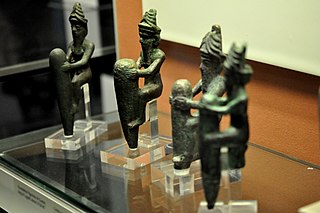
The Anunnaki are a group of deities of the ancient Sumerians, Akkadians, Assyrians and Babylonians. In the earliest Sumerian writings about them, which come from the Post-Akkadian period, the Anunnaki are deities in the pantheon, descendants of An and Ki, the god of the heavens and the goddess of earth, and their primary function was to decree the fates of humanity. They should not be confused with the Apkallu.

In Christianity, Jesus is believed to be the Son of God as written in the Bible's New Testament, and in mainstream Christian denominations he is God the Son, a person of the Trinity of God.

Fallen angels are angels who were expelled from Heaven. The literal term "fallen angel" does not appear in any Abrahamic religious texts, but is used to describe angels cast out of heaven or angels who sinned. Such angels often tempt humans to sin.

Proto-Indo-European mythology is the body of myths and deities associated with the Proto-Indo-Europeans, speakers of the hypothesized Proto-Indo-European language. Although the mythological motifs are not directly attested – since Proto-Indo-European speakers lived in preliterate societies – scholars of comparative mythology have reconstructed details from inherited similarities found among Indo-European languages, based on the assumption that parts of the Proto-Indo-Europeans' original belief systems survived in the daughter traditions.

Jesus, also referred to as Jesus Christ, Jesus of Nazareth, and many other names and titles, was a first-century Jewish preacher and religious leader. He is the central figure of Christianity, the world's largest religion. Most Christians believe Jesus to be the incarnation of God the Son and the awaited messiah, the Christ that is prophesied in the Old Testament.
The Genesis creation narrative is the creation myth of both Judaism and Christianity. The narrative is made up of two stories, roughly equivalent to the first two chapters of the Book of Genesis. In the first, Elohim creates the heavens and the Earth in six days, then rests on, blesses, and sanctifies the seventh. In the second story God creates Adam, the first man, from dust and places him in the Garden of Eden. There he is given dominion over the animals. Eve, the first woman, is created from Adam's rib as his companion.
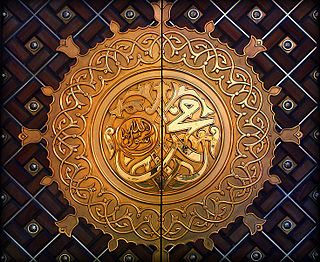
Muhammad ibn Abd Allah ibn Abd al-Muttalib is believed to be the seal of the messengers and prophets of God in all of the main branches of Islam. Muslims believe that the Quran, the central religious text of Islam, was revealed to Muhammad by God, and that Muhammad was sent to restore Islam, which they believe did not originate with Muhammad but is the true unaltered original monotheistic faith of Adam, Abraham, Moses, Jesus, and other prophets. The religious, social, and political tenets that Muhammad established with the Quran became the foundation of Islam and the Muslim world.

Islam is an Abrahamic monotheistic religion centered on the Quran and the teachings of Muhammad, the religion's founder. Adherents of Islam are called Muslims, who are estimated to number approximately 1.9 billion worldwide and are the world's second-largest religious population after Christians.
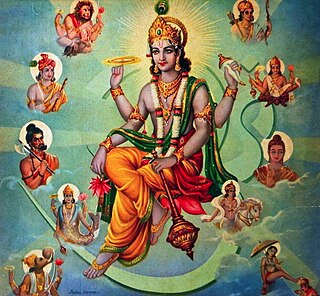
Vaishnavism is one of the major Hindu denominations along with Shaivism, Shaktism, and Smartism. It is also called Vishnuism since it considers Vishnu as the sole supreme being leading all other Hindu deities, that is, Mahavishnu. Its followers are called Vaishnavites or Vaishnavas, and it includes sub-sects like Krishnaism and Ramaism, which consider Krishna and Rama as the supreme beings respectively. According to a 2010 estimate by Johnson and Grim, Vaishnavism is the largest Hindu sect, constituting about 641 million or 67.6% of Hindus.
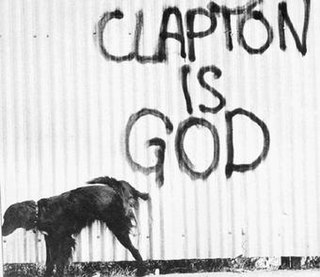
"Clapton is God" is a 1960s meme referencing the English guitarist Eric Clapton. The line was popularised after being spray-painted on a wall in London during the mid-1960s, when Clapton was a member of the Yardbirds and John Mayall & the Bluesbreakers, creating the cult of the guitar hero.

A deity or god is a supernatural being considered to be sacred and worthy of worship due to having authority over the universe, nature or human life. The Oxford Dictionary of English defines deity as a god or goddess, or anything revered as divine. C. Scott Littleton defines a deity as "a being with powers greater than those of ordinary humans, but who interacts with humans, positively or negatively, in ways that carry humans to new levels of consciousness, beyond the grounded preoccupations of ordinary life".
















